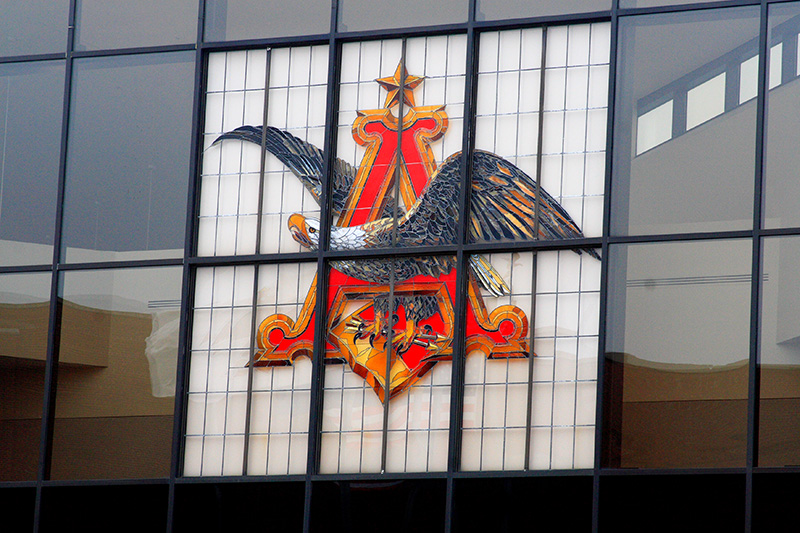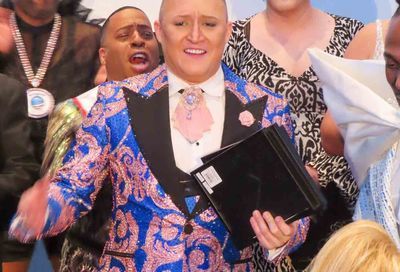D.C.’s LGBTQ bars struggle to adapt after ban on indoor dining
Some are temporarily shutting their doors, while others are offering carry-out or a heated outdoor haven.
By John Riley on December 24, 2020 @JRileyMW

The District of Columbia’s bars and restaurants have been dealt yet another blow in a year where many have already suffered due to government-enforced shutdowns amid the COVID-19 pandemic.
In April, D.C. Mayor Muriel Bowser issued a stay-at-home order for all District residents in an effort to reduce the spread of the potentially deadly COVID-19 virus. Under that order, bars and restaurants were allowed to continue offering takeout options if possible, but all indoor dining was banned.
Many in the foodservice industry had hoped that the ban was as bad as things would get, and, as the city moved into “Phase Two” of the COVID-19 recovery, began making plans for how they would rebound from the loss of business.
But then, last week, Bowser announced that the number of daily infections — 35 per day, on average — was sparking alarm among city health officials. Under the city’s guidelines, cases of 15 or more infections per day might indicate the need to return to “Phase One” of the District’s reopening plan, which was the situation in April.
As a result, effective Wednesday at 10 p.m., the District of Columbia will temporarily suspend indoor dining for the rest of the month, with the likelihood that the restrictions will remain in effect through much of January.
The announcement was the latest knock to the city’s once-robust but now-struggling restaurant industry, who have to contend with closing if they don’t offer substantial takeout options or outdoor dining space. The problem is exacerbated by the colder weather, as even those establishments that received winterization grants — allowing them to install space heaters in outside dining spaces, for example — are likely to experience a further drop in business.
Even places with a full kitchen, like Pitchers and its lesbian sister bar, A League of Her Own, say they are going to close down because they just haven’t been able to generate enough interest in takeout among their customer base.
“We tried offering takeout — it didn’t work,” says Dave Perruzza, owner of Pitchers and ALOHO, located in a single complex in the city’s Adams Morgan neighborhood. “In Adams Morgan, we don’t have a lot of people living around [the bar], whereas 14th Street has all the apartment buildings, and 17th Street is half-commercial and half-residential. On 18th Street, it’s more of a nightclub and business district. So we just don’t have the people coming by.
“You have to sell a lot of burgers just to maintain your kitchen expenses. And it costs so much to work with delivery companies like Grubhub and UberEats that it just doesn’t make any sense. Economically, it won’t work. Not for us, at least. People just aren’t calling Pitchers up for a burger or chicken. We have good food, but nobody’s going to wait 35 minutes for a delivery driver to bring it. And people aren’t getting enough drinks to make takeout worth it.”
As of 10 p.m. on Sunday, Dec. 20, the bar effectively closed for the foreseeable future. Perruzza has started a GoFundMe to try and wrangle some donations out of loyal customers, but it’s a tough slog.
“We’re closed until the mayor allows us to have indoor dining because there’s nothing we can do about it,” he says. “We were basically staying open to pay staff so the city doesn’t have to pay them in unemployment benefits. And now it’s at a point where you’re going to have more people on unemployment because my whole staff is going to have to apply, and some of them still won’t get it. I’m probably going to lose those people because they’re going to look for other jobs, and then I’m fucked.”
Perruzza is irritated because he believes that D.C. is simply following the actions taken by Maryland and Virginia, at the expense of D.C. businesses. For example, when Maryland and Virginia had instituted a 10 p.m. “last call,” D.C. city officials feared that suburbanites would flock to the city during the hours between 10 p.m. and midnight in order to keep partying, which might exacerbate the spread of COVID-19. As a result, the District changed its closing time to 10 p.m., resulting in Pitchers losing half its income, since most people traveling to bars aren’t going out until the evening hours.

The 10 p.m. closing time — even before the ban on indoor dining was announced — was a huge sore spot for bar owners and managers, who were forced to shut their doors just when things were starting to get busy.
“People aren’t leaving your bar at 10 p.m. and saying, ‘Okay, time to go home,'” says Justin Parker, the co-owner of The Dirty Goose. “They’re crowding together with other people, and finding something to entertain themselves at someone’s house. I think city officials mistakenly think that patrons are just leaving bars and going straight home. From what I’ve seen, that’s not the case. They’re not ready to be done socializing, so they figure out something that isn’t at the bars to do.”
The reduced hours came on top of additional restrictions imposed by Bowser starting on Dec. 14, when food establishments were told they had to limit indoor gathering sizes to parties of 10, and outdoor gatherings to 25 people, and cap the total capacity in dining or drinking establishments at 25 percent.
Parker and his husband and business partner, Daniel Honeycutt, are discussing creative ways to pivot towards offering takeout. In lieu of a full menu, the bar has been baking different types of cookies to sell along with cocktails, and Parker expects to sell packages of baked goods, as well as individual drinks or make-your-own drink packages, that customers can pick up from the bar. Parker and Honeycutt are also looking into delivery service as well, though the cost may be prohibitive.
“If you go through delivery services, you not only have the 15 percent fee that they’re charging you that D.C. set the cap at, but at that point, your employees who are working at the bar are no longer considered a ‘tipped wage’ employee,” Parker notes. “So your payroll cost is going to go up exponentially because the tipped wage and the minimum wage are much different. So at that point, that’s where you have to consider whether there are enough sales to justify certain days being open and paying someone a wage.”
Doug Schantz, the owner of Nellie’s Sports Bar, says that, prior to the most recent restrictions, the bar was already reaching 25 percent capacity, so the reduction didn’t really affect business. He had been expecting some decline in business during the winter months, but since indoor dining was cancelled, the bar will now return to offering takeout — a move that allowed it to survive during the earliest months of the pandemic. Currently, the bar has three takeout windows: two on U Street NW and one on 9th Street NW, where people can order food and drinks to take home.
“We’re limited now. We went from 55 employees to about 12,” says Schantz. “You still have your hard costs, which are tough. But we’ve done a lot of cutting back in terms of electricity and using only two of our five bars. So we unplugged different things that we don’t need and we’re just being very economical that way. We just are really looking at every single penny that we spend. It needs to be used wisely.”
Ed Bailey, co-owner of Number Nine and Trade, says his establishments will comply with whatever rules exist. Bailey says he will try to be open for business as much as humanly possible, in order to ensure employees of both establishments can still get paid, so long as there is money to earn and business doesn’t drastically decline due to lack of indoor dining and cold weather.
“You can’t really make long term plans about how you’re going to do something,” he says, noting that he and his partners are trying to be flexible, but doesn’t know what the winter will have in store for the bars.
“We offer carry-out, and we have from the beginning,” he says. “It’s done very well, but that’s also been when people have been on the street. We haven’t lived through the pandemic when it’s freezing cold out. So will people do carry-out when it’s cold? I don’t know. Will we try it? Yes, we will. But I can completely see why some businesses are just like, ‘We’re going to take a break,’ because you’re just trying to reformulate and reinvent yourself in ways where you start twisting yourself into knots.”
City officials have indicated they plan to reopen indoor dining in a limited capacity in January, though it’s unclear when. Bailey believes Bowser is making a decision to close in December in an attempt to try to reopen some dining in time to cater to any out-of-town visitors coming to the District for the presidential inauguration.
“I can only imagine how complicated it is for the mayor, trying to figure out how to make the right decisions about all of the variables involved in this process,” Bailey says. “And making sure people feel like their business is viable, that people are still having opportunities to work, that the economy is still at least alive in some aspect. And then balancing that against what seems to be the right decisions from a health perspective and making the right calls to make people as safe as they can be, knowing that some people don’t heed any of the advice or guidelines or protocols at all, and knowing that other people take it incredibly seriously.”
Bailey says the mayor is in a difficult position because there are so many people who complain about any shutdowns while an equally large number will criticize establishments that stay open during the pandemic.
“I don’t know how you possibly look at anybody who’s making these decisions and be upset with them,” he says. “This is just a bad situation, and had we had a larger, overarching national strategy from the beginning, we’d probably be in a very different place today than we are. But we didn’t.”
He notes that there was “no strategy across state lines from the very beginning about how we were going to do this. And I assume we’re going to get a larger, overarching vision of a strategy starting after the inauguration.”
Howard Hicks, the manager of the Green Lantern, notes that the bar has followed all of the city’s guidelines, and has applied for several grants offered by the city to help keep small businesses operational.
Prior to the ban on indoor dining, the Green Lantern attempted to rescheduled its famous Shirtless Happy Hour from 10 p.m. on Thursdays to 8:30 p.m., as well as offering an additional happy hour opportunity on Saturdays around 6 p.m, but Hicks says that even that event — with its unique identity and strong branding — has not attracted the same amount of business as it did pre-COVID.
The situation now becomes much more complicated with the mayor’s most recent order, although the bar has announced it will continue to serve people in its outdoor space during the hours of 4-10 p.m. from Thursday to Sunday of each week. Due to limited seating, reservations are recommended.
“We have 40 seats outside. We’ve got heaters, because we did get one of the winterization grants. So we’ve got heaters. And we’re kind of keeping our fingers crossed that there aren’t too many days where the wind and cold make it not worth it to come out,” Hicks says. “But on days when the weather’s nice and people are willing to sit outside, the heaters help an awful lot.”
In an early December interview, Hicks expressed frustration at the District’s push for reduced hours and reduced capacity, recommending that the city eventually walk back those restrictions, even though the Green Lantern wasn’t as affected as other bars, because it could utilize some of its second-floor space to spread people out.
In terms of the future of the nightlife industry, Hicks says, “it’s just a matter of how quick a vaccine gets out and how quickly restrictions are lifted that get us closer back to normal, because obviously no one’s really making any money. Most of the bars are hurting. How do you keep on losing money for another eight months?”
Mark Lee, director of the D.C. Nightlife Council, says the restrictions on reopening have “decimated” the nightlife and hospitality community, with sales down about 55% from the previous year.
“One of the great things about D.C. that I always like to remind people is that we’re unique among larger cities across the country in that about 96 percent of the establishments, restaurants, bars, nightclubs, multipurpose facilities, music venues, entertainment venues are locally-owned and -operated and are small businesses,” he says. “But because of that, the impact has been even harder.”
While largely offering praise for the way city officials have handled the overall response to the pandemic, he also criticized the city’s previous push for an earlier closing time, which has cost businesses up to 60 percent of what they were making since entering Phase Two this summer.
“Some of the reactions I’m hearing, not just the financial impact, but what makes that decision disappointing, is that it is not based on any data or evidence-based rationale. There’s no contact tracing or even anecdotal information that would suggest that there was a problem occurring with the sale of alcohol between the hours of 10 and 12. It seems more in response to public discomfort or concern.”
To assist businesses within the hospitality industry, the D.C. government has launched the Bridge Fund, which uses the federal CARES Act to provide financial relief to small businesses in various industries. Restaurants whose food sales comprised more than 25% of their business last year can apply for money through the Restaurant Bridge Fund. Those that didn’t must apply through the Entertainment Bridge Fund, which began accepting applications on Monday.
Lee praises the elected officials in the District for trying to provide help to the hospitality industry, which is the District’s second-largest local employer.
“The nightlife community contributes, in normal times, $800 million in direct tax revenues to the city. And that doesn’t include the income taxes on the nearly 70,000 people who work in the industry,” says Lee, noting that a higher percentage — about one-third — of service industry workers are District residents, whereas D.C. residents comprise only 20% of the District’s total workforce overall.
“The hospitality industry is one of opportunity,” says Lee. “People can earn good incomes and can afford to live in the city. And among them are some of the most interesting, creative, hardworking and interesting people engaged and as musicians or writers or all kinds of things on the side. It’s a very dynamic community.
“What’s very frustrating and scary, is that the city could lose some of the people that make this town the best that it can be,” he adds. “A lot of people are finding that without the opportunity to work in the hospitality industry, like a lot of people around the country, they’re moving to other jurisdictions, they’re moving home, they’re going other places to stay with friends, or they’re looking at exploring career opportunities outside of the industry. So it’s a very fragile time for the business community, but also the local community. We’re really on the precipice of being able to make it or not.”
Lee suggests that one action the District could take, in order to ensure mass closures of small businesses do not occur, would be to allow bars, restaurants, and nightclubs to retain all or a portion of the 10% sales tax revenue they generate as an indirect grant.
“Aside from the cultural amenities and the social amenities and the cultural enjoyment of living here, the more serious contribution that the hospitality industry makes to the quality of life in the city is we raise the money that helps pay for the social service programs and other priorities of the government,” Lee says. “The economic health and well-being of the city depends on that.”
Read More
Kathy Griffin shades ex-NFL player’s Trump-supporting gay son on Twitter
Trump appoints Richard Grenell to Holocaust Memorial Council
Riki Wilchins: ‘Not Passing is Now a Criminal Offense’
Thanks to the Trump administration, policing gender is becoming the norm -- and it's about much more than trans women.
By Riki Wilchins
March 29, 2025
A Tucson Walmart called the police on a Black "stud"-identified lesbian last month, claiming a man had entered the women's room.
The two male Pima County sheriff's deputies accosted 19-year-old Kalaya Morton just after she had used a tampon and while she was in the stall still trying to pee.
They demanded that she come out immediately, which she was unable to do. Even after she finished her business and exited the stall, lifting her shirt to show the two men that she was a cisgender woman, one of the male deputies still complained that Kalaya "looked like a man."
And there you have it.
Anheuser-Busch, Others Drop Funding for San Francisco Pride
Several corporate sponsors have pulled financial support for this year's San Francisco Pride, resulting in a $300,000 shortfall.
By John Riley on March 24, 2025 @JRileyMW
Several corporate sponsors of San Francisco Pride, including beer giant Anheuser-Busch, have pulled their funding for the celebration's annual festivities.
Over the past four weeks, the companies have informed organizers of San Francisco Pride that they would not be able to support 2025 Pride, claiming a lack of funds as the reason.
None of the companies cited the political climate, but Suzanne Ford, the executive director of San Francisco Pride, said that it was "very abnormal" for several multi-year sponsors to drop their support.
"I just interpreted that companies are making decisions that at this time it’s not good to be sponsoring Pride," Ford told SFGATE magazine, alluding to decisions by several major corporations to abandon diversity, equity, and inclusion (DEI) initiatives.
Attackers Use Grindr to Lynch Gay Israelis in Haifa
Groups of masked assailants are reportedly using the gay dating app to lure LGBTQ Israelis into meeting to maim or kill them.
By John Riley on March 16, 2025 @JRileyMW
Masked attackers in Israel are reportedly using Grindr to lure and entrap members of the LGBTQ community to severely harm them.
According to reports, the assailants are creating fake profiles on the popular dating app and arranging meetings in remote locations in the city of Haifa.
The victims are then ambushed and reportedly stabbed with sharp weapons. A few assailants have attempted to carry out lynchings.
The Aguda, an LGBTQ task force, documented at least ten such incidents in recent months, reports the Jerusalem Post.
But some victims have chosen not to report the attacks, making it more difficult for police to track down and arrest offenders.
Support Metro Weekly’s Journalism
These are challenging times for news organizations. And yet it’s crucial we stay active and provide vital resources and information to both our local readers and the world. So won’t you please take a moment and consider supporting Metro Weekly with a membership? For as little as $5 a month, you can help ensure Metro Weekly magazine and MetroWeekly.com remain free, viable resources as we provide the best, most diverse, culturally-resonant LGBTQ coverage in both the D.C. region and around the world. Memberships come with exclusive perks and discounts, your own personal digital delivery of each week’s magazine (and an archive), access to our Member's Lounge when it launches this fall, and exclusive members-only items like Metro Weekly Membership Mugs and Tote Bags! Check out all our membership levels here and please join us today!
The Magazine
-
Most Popular
 Gay Army Reserve Officer in Uniform Sex Video Scandal
Gay Army Reserve Officer in Uniform Sex Video Scandal  Signature Honors Mandy Patinkin in Emotional Celebration
Signature Honors Mandy Patinkin in Emotional Celebration  MISTR's Free DoxyPEP Leads to Huge Drop in STI Rates
MISTR's Free DoxyPEP Leads to Huge Drop in STI Rates  Becca Balint: The Pride of Vermont
Becca Balint: The Pride of Vermont  'Gray Pride' Protests Hungary's Ban on Gay Pride Marches
'Gray Pride' Protests Hungary's Ban on Gay Pride Marches  Bea Arthur's Air Force Bio Purged by Department of Defense
Bea Arthur's Air Force Bio Purged by Department of Defense  Hugh Bonneville Delivers a Show-Stopping Vanya
Hugh Bonneville Delivers a Show-Stopping Vanya  A Potent (and Pricey) 'Good Night, And Good Luck'
A Potent (and Pricey) 'Good Night, And Good Luck'  Sarah Snook is Astonishing in Broadway's 'Dorian Gray'
Sarah Snook is Astonishing in Broadway's 'Dorian Gray'  Jared Polis Signs Law Repealing Colorado's Gay Marriage Ban
Jared Polis Signs Law Repealing Colorado's Gay Marriage Ban
 Becca Balint: The Pride of Vermont
Becca Balint: The Pride of Vermont  Signature Honors Mandy Patinkin in Emotional Celebration
Signature Honors Mandy Patinkin in Emotional Celebration  MISTR's Free DoxyPEP Leads to Huge Drop in STI Rates
MISTR's Free DoxyPEP Leads to Huge Drop in STI Rates  A Potent (and Pricey) 'Good Night, And Good Luck'
A Potent (and Pricey) 'Good Night, And Good Luck'  Sarah Snook is Astonishing in Broadway's 'Dorian Gray'
Sarah Snook is Astonishing in Broadway's 'Dorian Gray'  'Gray Pride' Protests Hungary's Ban on Gay Pride Marches
'Gray Pride' Protests Hungary's Ban on Gay Pride Marches  Jared Polis Signs Law Repealing Colorado's Gay Marriage Ban
Jared Polis Signs Law Repealing Colorado's Gay Marriage Ban  White House Ignores Reporters with Pronouns in Email Signatures
White House Ignores Reporters with Pronouns in Email Signatures  White House Demands NIH Study Transgender Transition "Regret"
White House Demands NIH Study Transgender Transition "Regret"  Air Force Reverses Ban on Pronouns in Email Signatures
Air Force Reverses Ban on Pronouns in Email Signatures
Scene
Metro Weekly
Washington's LGBTQ Magazine
P.O. Box 11559
Washington, DC 20008 (202) 638-6830
About Us pageFollow Us:
· Facebook
· Twitter
· Flipboard
· YouTube
· Instagram
· RSS News | RSS SceneArchives
Copyright ©2024 Jansi LLC.













You must be logged in to post a comment.